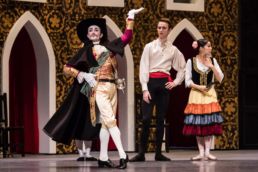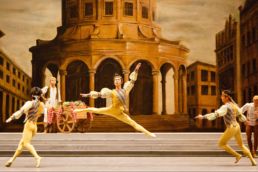How old were you when you started ballet?
I started learning ballet at the age of 10, but before that, I also learnt gymnastics when I was four, and latin dance at the age of eight. I only started ballet when I entered in to Shanghai Dance School.
What was the first ballet you ever saw?
The first ballet I watched was on a DVD when I was about 12 years old, it was Don Quixote by the American Ballet Theater. The first theatre performance was when I was about 16 years old, I watched Swan Lake by the Shanghai Ballet Company. I remember being very impressed by the male lead and felt like I could learn a lot from him just by watching, but did not think too much about how it could have been reflected in my life as I was still young and was only a student.
When did you decide to pursue a professional career?
I decided to enter into Shanghai Dance School at the age of 10, and had to leave home for quite a distance. Initially, I wanted to become a dance teacher or physical trainer. But as I learnt and grew as a dancer, I aspired to become a professional performer because I felt like I have trained so hard and wanted to put what I’ve learnt on stage for an audience. That was when I took ballet a lot more seriously, and strived to become a better dancer in every aspect. I was about 18 years old when I made up my mind to pursue ballet as my professional career.
When and where did you start your training, and did you enjoy it?
As a dance student, it was very pressurising and stressful in Shanghai. As I was one of the shorter male dancers, I always felt like I was weaker and disadvantaged as compared to the taller male dancers. But the positive side of things is that I made it a point to train harder and to spend more time practicing to make up for my height. I enjoyed my training because it brought me to where I am today. I joined the Shanghai Ballet Company as an apprentice when I was 17, and was promoted to an Artist six months later.
When and how did you join SDT?
While I was in Shanghai Ballet Company, I felt a little out of place as a lot of the male dancers are very tall, so I wanted to explore other companies. That was when my fellow schoolmate from Shanghai Dance School recommended and told me about SDT then. I came over to audition in October 2012, and was offered a place and joined the company as an apprentice in November. I was later promoted to an Artist in August 2013.
What was your first role in SDT as a professional dancer?
My first performance with SDT was Sleeping Beauty in 2012. Having seen many different variations of this repertoire, it was interesting to be a part of the staging of SDT’s variation, which was staged by our Artistic Director, Janek Schergen. I don’t usually get nervous about a performance, but I guess I was quite excited about finally dancing as a professional dancer.
How do you learn a ballet?
I learn the movements by first observing, and then incorporating it with the music. Classical works are generally easier to learn as I’ve grown up learning the techniques for it, while contemporary works vary on a very large scale and I will have to adapt to that style and way of movements. I personally prefer dancing classical choreographies than contemporary. But I will strive to give my best in whatever work I am casted for.
What is a typical rehearsal day like?
We start our day with company class every week day, and we have a full day of rehearsals for the upcoming performances. We have short breaks in between rehearsals, and during the hour lunch break, I would usually try to rest my body. To me, it is very important to ensure that I am well rest physically so that I am able to have enough energy to last the day of dancing.
Do you have any pre-performance rituals?
Other than warming up and stretching before going on stage, I do not have any pre-performance ritual. I don’t usually practice before the performance, as I make sure that I have practiced and thought through my dance well before the performance day itself. So once the show begins, it is just about going up on stage with confidence and dancing from my heart. If I ever do get nervous, I would take a deep breath, and I would be good to go! (laughs)
What do you eat on a big rehearsal/performance day?
My diet is as per usual on a performance day. I try to eat well and balanced meals every day, so it does not vary much on a big rehearsal or the day of the show.
What is your dream role?
I would love to dance in Le Corsaire. I’ve already danced this ballet in school, but my dream would be to perform this ballet on a professional stage. I like dancing choreographies that are stronger and more explosive, works that are filled with powerful leaps and faster movements, and I feel that Le Corsaire is such a choreography.
What is your favourite costume so far?
My favourite costume that I’ve seen while in SDT would be Basilio in Don Quixote. It speaks of a strong character although Basilio is not your typical prince or king character. The costume also carries a Spanish flavour and has a very special touch to it, so it looks really unique.
Who is your favourite choreographer in the works you’ve danced?
Cynthia Harvey. Firstly, it is because I love Don Quixote, but more importantly, it is because Cynthia Harvey is very experienced in this repertoire, and so she is extremely confident of what she wants to achieve with this ballet. It was really enjoyable working with her as I learnt a lot from it.
Do you watch ballets from the wings?
No, I do not usually watch from the wings unless I am preparing to go on to stage next. I prefer watching the ballet from the television at the backstage as I like to see the performance from the audience point of view.
How do you feel after a performance?
If there isn’t any movements that are out of my comfort zone, I am generally quite confident of myself, so I won’t worry too much about making mistakes and such. But if there was a challenging movement or series of steps in the performance, like faster routines or lifts, I would analyse how I did and try to improve from there.
What do you like to do outside of SDT?
I am currently taking classes to learn English, and learning about music on my own as well. I also go to the gym to keep fit and train my strength.
Do you have a “guilty pleasure”?
If I know that something isn’t good for me, I wouldn’t do it, so I don’t really have any guilty pleasures.
Are most of your friends dancers?
Not all of my friends are dancers, some of them own businesses and some of them are in other industries as well in America, Hong Kong, and other countries.
What is your most prized possession?
My most prized possession is my memory, because the past is something you can never experience ever again, so holding precious moments in my memory is something that is very important to me. Other than that, my family is really close to my heart as well.
How does your family feel about your career?
They’ve never objected my decisions. Life is for you to discover, to make your own choices and learn as you go along the way. So my parents have always allowed and supported me to be quite independent in my decisions. They haven’t been here to Singapore before, but they should coming soon to visit.
What do you want to do after dancing?
I want to be a dance or ballet teacher in Singapore, but it also depends on the opportunities that come along the way as life unfolds. But I would probably stay in Singapore after dancing because I enjoy this city and environment very much.



